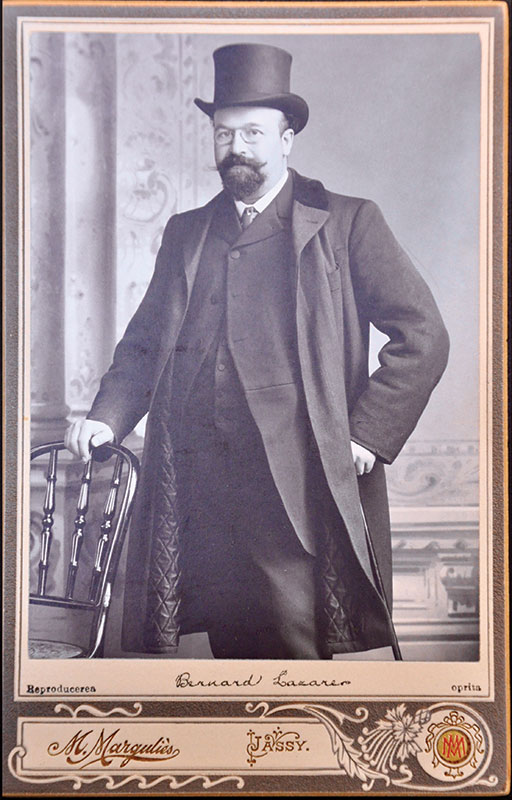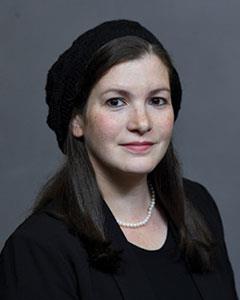Above: R.B. Kitaj. Eclipse of God (After the Uccello Panel Called Breaking Down the Jew's Door), 1997-2000. Oil and charcoal on canvas, 35 15/16 in. x 47 15/16 in. Purchase: Oscar and Regina Gruss Memorial and S. H. and Helen R. Scheuer Family Foundation Funds, 2000-71. Photo by Richard Goodbody, Inc. Photo Credit: The Jewish Museum, New York / Art Resource, NY. © 2020 R.B. Kitaj Estate
RESPONDING TO HATE
Madonna reclaimed “bitch.” The gay pride movement reclaimed “queer.” And if you go back a little farther, you will find that the Jews reclaimed “pariah”—or at least briefly thought about it.
France at the turn of the twentieth century was an easy place for Jews to become pariahs. The Dreyfus Affair had raised popular antisemitism from a slow simmer to a fast boil, and Jews reacted in large measure by turning inward, declining to defend the wrongly accused Jewish army captain, and in some cases even joining the masses in rallying against him. Bernard Lazare (1865–1903), a French Jewish public intellectual at the time, would later recall how readily French Jews had internalized the hate directed at them and bought into the dominant antisemitic culture that celebrated Dreyfus’s exile to a remote penal colony: “Even if some three dozen of them were to be found to defend one of their martyred brothers, thousands would have been found to mount watch around Devil’s Island, along with the most devoted champions of the fatherland.”i

Portrait of Bernard Lazare, Jassy (Romania), 1902. Photo by M. Marguliès. Courtesy of the Library of the Alliance Israélite Universelle (Paris), Fonds Bernard Lazare.
When Bernard Lazare urged his fellow Jews to become “conscious pariahs” amid the raging antisemitism of the Dreyfus Affair in late nineteenth-century France, he was not asking them to accept the hatred society directed towards them. Quite the opposite: he was asking them to reclaim the pejorative term and use it to energize a renewed Jewish identity.
Jewish self-hatred has long persisted as the shadowy underbelly of antisemitism, and the Dreyfus Affair was neither the first nor the last time that Jews would readily denigrate one another and themselves for the benefit of social acceptance. But it was a crucial event for Bernard Lazare, who would go on to become one of the first thinkers to analyze Jewish self-hatred in modern times. Lazare had wrestled with his own self-hatred for years before the Dreyfus Affair changed his mind. Early in his career, Lazare participated in the elite antisemitic literary and political circles of fin-de-siècle Paris and wrote numerous antisemitic essays about other Jews whom he deemed too wealthy, too foreign, and too religious. Seeing the dangerous effects of this antisemitic rhetoric take shape in the persecution of Alfred Dreyfus, however, Lazare repented of his earlier views and likewise sought to change the minds of other Jews who had adopted antisemitic opinions, too.
The modern experience of Jewish self-hatred emerged alongside Emancipation, the process by which Jews gained citizenship in countries where they had historically been denied equal status. This was no coincidence, Bernard Lazare argued. Eager to nurture the reluctant tolerance of their Christian peers into a more fraternal respect, these newly emancipated Jews were ready to adopt their neighbors’ antisemitic viewpoints and amplify their own stature by denigrating that of other Jews around them. Lazare pointed to the rich Sephardic Jews of Bordeaux, who, immediately after gaining citizenship, actually protested against extending emancipation to their poorer Ashkenazic brethren in Alsace. “This attitude of the Bordeaux Jews gradually spread among the Jews of the West in proportion as they recovered their dignity as men,” he wrote.
The Western Jew retained the status of Other in the eyes of all who saw him—including his own.
Thus, while he may have been granted citizenship and freed from the physical ghetto, the Western Jew had learned to inhabit a psychological or “moral” ghetto, according to Lazare. This moral ghetto was even worse than the physical one because the Jew himself actively participated in its making. “That was the mistake and the sin of the Western Jew; he was not able to worthily enjoy his freedom; he did not look upon it as something which was due to him, which had been stolen from him and which he was recapturing, but as a thing granted to him, of which he must make himself worthy.” In this way, the Western Jew became a “pariah,” in Lazare’s language, still suffering the persecutions and soft bigotry of a popular antisemitism accepted and turned against himself. He retained the status of Other in the eyes of all who saw him—including his own.
Inevitably, the Jewish pariah seeks a way to ameliorate his condition. He desperately strives to separate from his besmirched lineage and assimilate into the masses. In so doing, he becomes what Lazare calls “un parvenu.” The parvenu, meaning something akin to “social climber,” begins to “de-Judaize” himself, Lazare writes, until “he has lost his own virtues and acquired only the vices of those who surround him.” In Lazare’s opinion, French Jews were the ultimate parvenus. “They were not satisfied with becoming more jingoist than the French people of France; as in all countries where the Jews have been emancipated, they have voluntarily shattered the solidarity which existed among them.”
Lazare’s “pariah” and “parvenu” have become the typologies referenced by numerous thinkers over the past 120 years. Hannah Arendt adopted the term “pariah” to describe an array of Jewish historical figures ranging from Heinrich Heine to Franz Kafka. She also lamented that the majority of Jews were parvenus, “continually trying to disguise an imaginary stigma” with eagerly embraced Diaspora nationalities. Jean-Paul Sartre described the differences between the “authentic” and “inauthentic” Jew in the same way: “It is not the man, but the Jew, whom Jews seek to know in themselves through introspection; and they seek to know him in order to deny him,” he wrote. Isaiah Berlin crafted a parable about the Jews as the archetypal parvenus, likening them to a band of travelers who stumble upon a native tribe and so desperately seek acceptance therein, they become willing “to live or die for it, and if need be, with it, no less bravely and perhaps with greater passion, than the natives themselves.” This despite the fact that their willing sacrifice makes the natives hate them even more.
But the Jewish pariah need not always be doomed—he does not have to become a parvenu. Lazare argued that he could instead become conscious of his pariah status and own it as his true identity, thereby also regaining his power as an individual and as a member of the Jewish community. Lazare thus chose to reclaim the pejorative term and urged his fellow Jew to joinhim in becoming a “conscious pariah,” actively resisting the antisemitism foisted upon him and the self-hatred succumbed to by others. Only a conscious pariah, Lazare argued, might successfully defend his integrity, and help to build a new national identity without shame. “He is a pariah; emancipated or not,” Lazare wrote, “So it is as a pariah that he must defend himself, through duty to his own being, for every human creature must know how to resist oppression and preserve his right to total development, his freedom to be and to be himself.” To this end Lazare encouraged Zionism, the pursuit of a homeland for conscious pariahs, who would be revolutionaries not only in the society of others, but also in their own. Though Jews in the twenty-first century may not wish to identify as pariahs and may cringe when reading news items that reference Israel as a “pariah state,” Lazare’s message still rings true. And the term “pariah” may still be proudly redeemed.

LAUREN GOTTLIEB LOCKSHIN is assistant professor of History at Touro College, Lander College for Women. She completed her PhD in Jewish History at Yale University in 2019..
i Bernard Lazare, “Nationalism and Jewish Emancipation” (1899) in Job’s Dungheap by Bernard Lazare, ed. Hannah Arendt, trans. Harry Lorin Binsse (New York: Schocken, 1948). All other quotations cited here can be found in the same landmark essay written by Lazare at the end of the Dreyfus Affair and revised two years later.